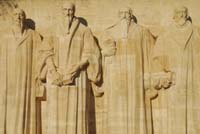 Keeping Watch and Being Ready
Keeping Watch and Being Ready
Matthew 24:36-51
Theme: Christ’s imminent return.
This week’s lessons teach us what will happen to those who are not ready when Jesus returns.
Lesson
One of the most well-known passages dealing with the end times is not found in the book of Revelation, but in Matthew, chapter 24. In this passage, Jesus is teaching his disciples what signs will accompany his return. What the disciples were to know is that "when you see all these things" the end will be "near, right at the door." It refers to the terrible characteristics of their age, and ours–false messiahs, wars, earthquakes, famines, persecutions, apostasy, and false prophets–all of which Jesus’ disciples saw in their time and we continue to see today. Having seen these things, we should know that the return of Jesus Christ is near, even at the door. That door could be flung open by Christ at any moment.